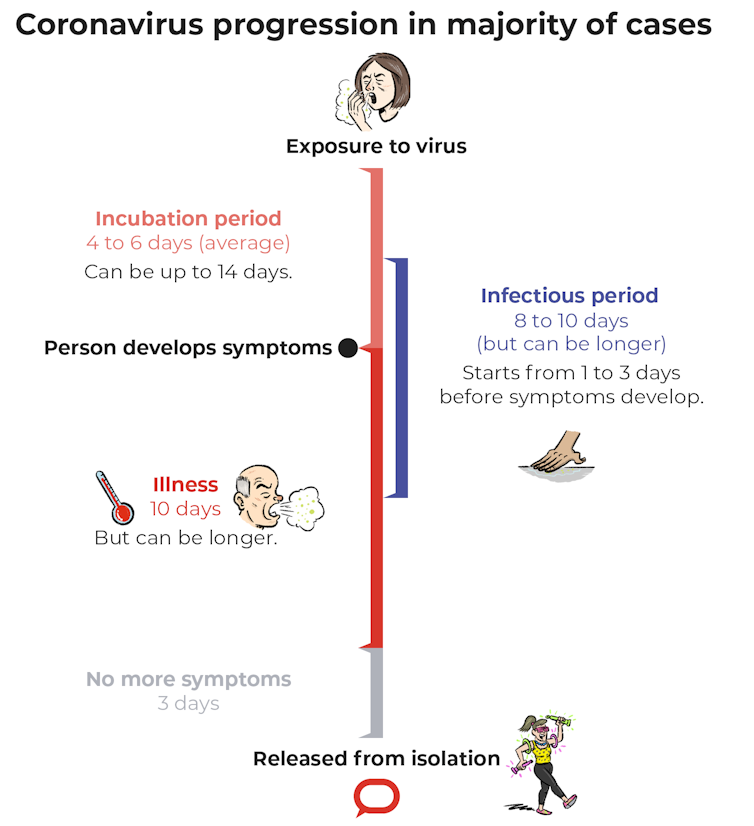Can I Get Covid a Month After Having It
As the coronavirus pandemic stretches on, a pocket-size proportion of Australians infected have at present died, while most have either recovered, or are likely to recover over the adjacent few weeks.
One thing many of u.s.a. want to know is for how long people who have SARS-CoV-2, the virus that causes COVID-19, are able to pass information technology on to someone else.
Let'due south wait at what the science tells us and so far.
How long does it take to go sick?
The "incubation menstruation" is the time betwixt being exposed to the virus and the onset of symptoms.
For COVID-19, the incubation period ranges from 1 to xiv days. Only most people who develop COVID-nineteen symptoms do so four to half-dozen days after exposure.
Baca juga: Coronavirus: how long does information technology accept to become sick? How infectious is it? Will you lot always have a fever? COVID-19 nuts explained
How long are you infectious?
The "infectious period" means the fourth dimension you lot're able to spread the virus to someone else.
For COVID-nineteen, there is emerging prove to suggest the infectious period may start 1 to 3 days before you develop symptoms.
The almost infectious menstruation is thought to exist 1 to iii days before symptoms start, and in the outset vii days after symptoms begin. But some people may remain infectious for longer.
Normally reported symptoms for COVID-xix – such as fever, cough and fatigue – usually last around 9 to ten days simply this can be longer.

Why are some people infectious for longer?
Typically with viruses, the higher the viral load (the more virus circulating in the body), the higher the risk of transmission through known transmission pathways.
A study conducted in Hong Kong looking at viral load in 23 patients diagnosed with COVID-nineteen found higher viral loads in the commencement calendar week of illness.
Another study from China looking at 76 hospitalised patients institute that past x days after symptom onset, balmy cases had cleared the virus. That is, no virus was detectable through testing.
However, astringent cases take much higher viral loads and many proceed to test positive beyond the 10 days after symptoms start.
So the more than severe the disease and the higher the viral load, the longer y'all continue to shed the virus and are infectious.
Baca juga: How can I treat myself if I've got – or think I've got – coronavirus?
When are y'all no longer infectious?
If someone has been symptom-free for 3 days and they developed their kickoff symptoms more than ten days prior, they are no longer considered to be infectious.
But we're not sure whether people are infectious when they take recovered but the virus can notwithstanding be detected in their bodies.
One study from Hong Kong establish the virus could be detected for xx days or longer after the initial onset of symptoms in one-tertiary of patients tested.
Another report from People's republic of china found constitute the virus in a patients' faecal samples five weeks after the first onset of symptoms.
But the detection of the virus doesn't necessarily mean the person is infectious. We need more than studies with larger sample sizes to get to the bottom of this question.
Should you get tested once again before going back into the community?
Due to a global shortage of coronavirus tests, the Democracy and country governments take strict criteria most who should exist tested for COVID-19 and when.
Baca juga: Who can get tested for coronavirus?
People who take been self-quarantining, because they had contact with a confirmed case of COVID-19 and take completed their 14-day quarantine period without developing symptoms, tin can render to the community. At that place is no requirement to be tested prior to returning to the community. It is, still, recommended they continue to practise social distancing and skilful hygiene as a precaution.
The requirements are different for people who have been diagnosed with COVID-19.
At nowadays, re-testing people who have experienced mild illness, and accept recovered from COVID-19 is not recommended. A person is considered safe to render to the community and discontinue self-isolation if they are no longer infectious. This means they adult their start symptoms more 10 days prior and have not experienced any symptoms for at least 3 days (72 hours).
For people who have been hospitalised with more than severe illness, the testing requirements before discharge are different. They volition take two swabs taken 24 hours autonomously to bank check if they have cleared the virus. If the swabs are both negative, they tin can be discharged and don't require farther self-isolation.
If one or both tests are positive but the person is well enough to go dwelling, they must continue to self-isolate for at least ten days since they were discharged from hospital and they have not experienced any symptoms for at least 3 days.
At that place are too unlike testing requirements for people working or living in high-adventure settings. If you work or alive in a high-chance setting you should consult with your health intendance provider on re-testing requirements.
jenningssionerve1940.blogspot.com
Source: https://theconversation.com/how-long-are-you-infectious-when-you-have-coronavirus-135295
0 Response to "Can I Get Covid a Month After Having It"
Postar um comentário